A New Beginning
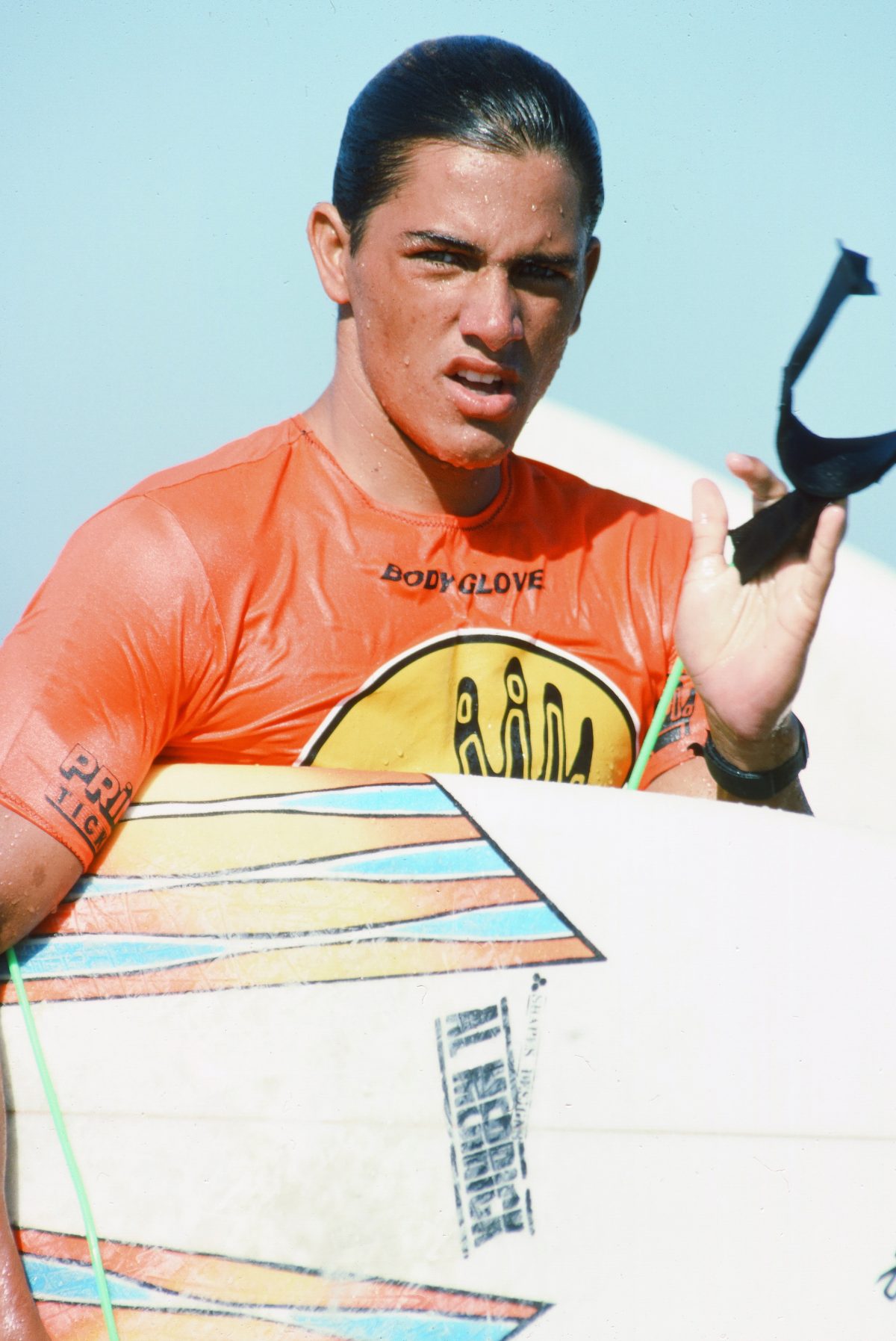
Kelly Slater, just days before his 50th birthday, won his 56th career pro contest at the Pipeline Pro in Hawaii. He is, by any measure, the most accomplished professional surfer in the world. It is difficult now to imagine him as an unproven 18-year-old in search of his first pro victory. But that’s who Slater was in September 1990 as the Cocoa Beach, Fla., high school senior traveled to California’s Lower Trestles to compete for what was then the richest first place prize at the Body Glove Surf Bout III. What happened next forever altered the sport of surfing.
Recounted by: surfers Kelly Slater, Bud Llamas and Pat O’Connell, former Los Angeles Times writer Mike Reilley, film director and Volcom founder Richard Woolcott, tour announcer Rockin’ Fig, Body Glove co-owner and tour director Ronnie Meistrell, and Prime Ticket TV commentators PT Townend and Mike Chamberlin. *We also used a Prime Ticket broadcast of the event to recreate the words of TV commentator Mike Chamberlin, who said he could not remember specifics, and dialogue from Woolcott’s 1991 film ‘Kelly Slater In Black And White.’ Click on the footnotes for more detail.
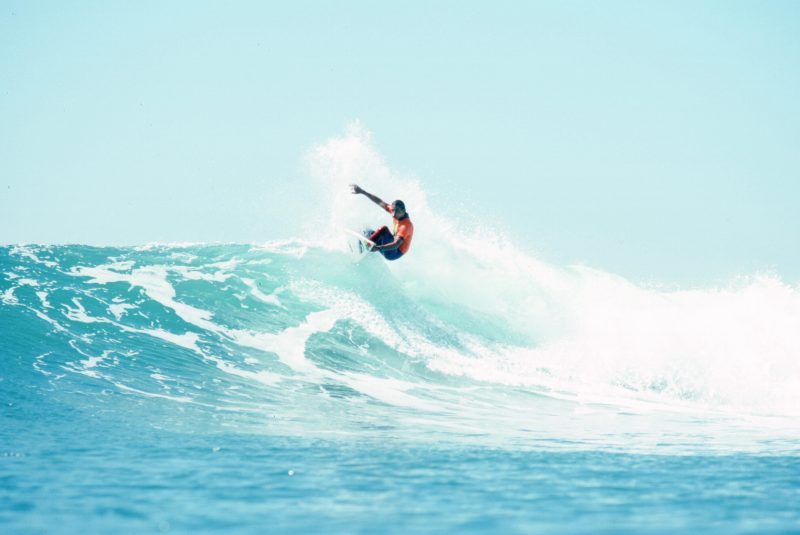
“I can probably look back and argue that was the most significant event for me maybe in my life.” Photo: Body Glove/Mike Balzer
Interviews by Dan Fitzpatrick
The New Kid
Bud: Slater was the new kid.
Kelly: I had turned pro that summer. I had been surfing pro contests for eight years since I was 12. I had the experience. I felt like I was looking at the wave a little differently than the standard surfing of the time. My confidence was getting bigger and bigger. 1
Pat: I knew he was going to be a world champion the first time I saw him.
Mike R.: There was all this mystique about him, this kid from Florida. It was an interesting time for surfing. The Aussies were very dominant and Tom Curren was about to take a year off from surfing and was getting a little long in the tooth.2 They needed a bright young star to come in and carry the torch for the sport.
Richard: Quiksilver was going after Kelly. They wanted him to be the next face of their brand. I was in the marketing department at that time and I remember all of the negotiations. He is supposed to be the next guy that takes surfing into the future and to break down barriers and win multiple world titles. So he has a lot of pressure on him to live up to those expectations.
Kelly: Quiksilver had reservations about signing me I only found out later on, because I had not won a world amateur event in three times trying. I felt like they were spending a lot of money and time and effort to promote who I was. I felt like it was really important for me to deliver. That puts a lot of pressure on a young guy.
Pat: Everyone was making a bid at him. I remember him having a little bit of fun with it. Never being stressed out. You kind of felt like things would work out for him. He doesn’t do any drugs; he doesn’t have the demons that some other people who are in that situation do. I felt like he had it under control. Maybe he felt different. It’s always easy to look at someone else’s life and feel like they have it figured out.
Richard: They ended up successfully signing Kelly. I was right in the middle of all the action. I had certain duties to help with here and there, go on photo shoots and travel with him. At the time I was thinking well gosh it would be fun to have a little video project with Kelly. A college friend of mine from Pepperdine, Jon Freeman, was making little surf movies during college and I thought well gosh Jon could help me work on this film. It was really a small side project. What was interesting is that one of the first big shoots was the contest.
“I felt like it was really important for me to deliver. That puts a lot of pressure on a young guy.”
Kelly: I just narrowly made it into the cutline for the number of guys to surf at the Trestles contest. I want to say I was in 90th place on the tour and 100 guys could surf.3
Fig: We already knew he was pretty much red hot. He had done well on events throughout the season. But heading down to Trestles you are looking at one of the best waves on the coast. If anybody is going to show their stuff that is where they need to be ready to go off.
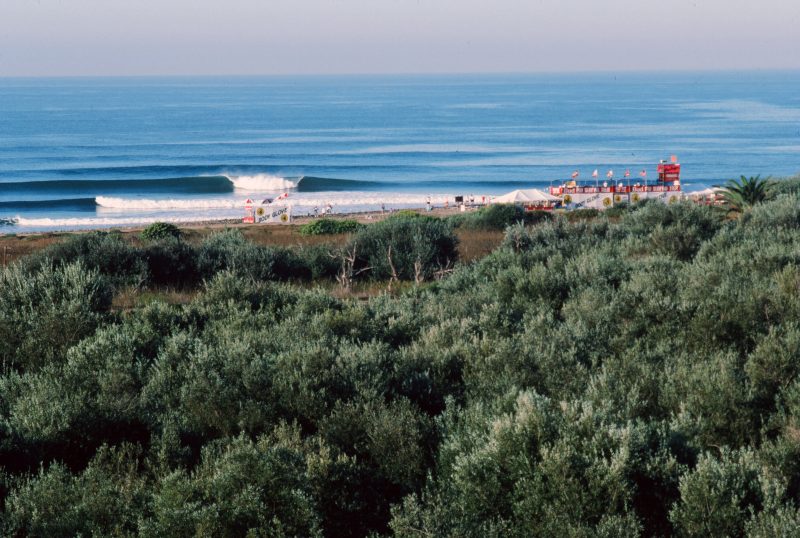
A view of Trestles in September 1990. Photo: Body Glove/Mike Balzer
30 Grand
Ronnie: I ran the contest. I set it up and I hired all the people, did all the sponsorships. Body Glove wanted to have the richest first place prize money ever given to any surfer anywhere on tour.4
Bud: It was 30 grand for first place which then was a lot of money. I knew I was coming to the end of my career and winning that 30 grand would have been a way to go out.
Richard: That prize purse was huge back then.
Kelly: I grew up in a small town in a relatively poor family. Just that money right there would have been more than enough to pay off the house we lost when I was younger.
Ronnie: I was expecting a high caliber of surfing. Lower Trestles is such a high quality wave and they were forecasting six to eight foot surf for first three days and then bigger sets on fourth, fifth and sixth day. I was going “are you kidding?”
Fig: When that place is on there is no better wave in California.
“That money right there would have been more than enough to pay off the house we lost when I was younger.”
Pat: Trestles back then that was the Holy Grail. Most of the events happened in parking lots with bad waves. If you were to look across what professional surfing was at the time it was big city beach, bikini show. It had nothing to do with actually trying to find better conditions and create an actual sporting event. Trestles was the one event where when you did actually lose you stayed and watched all day. For that reason I am sure Kelly wanted to win there super bad.
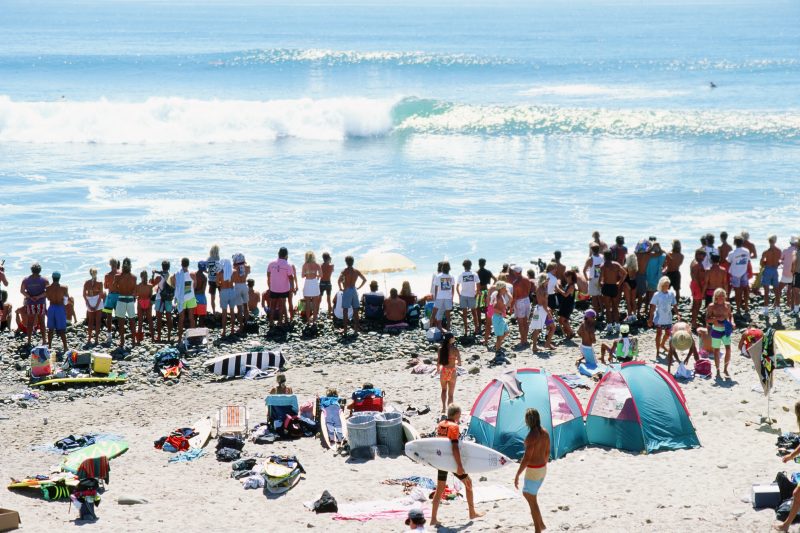
A crowd gathers to watch the Trestles contest in 1990. Photo: Body Glove/Mike Balzer
Why Is He Sleeping On The Floor?
Richard: I was living in Newport Beach5 and I had some roommates. Kelly was coming to town and we’re making this movie so let’s all hang out together and we will shoot some footage. Every morning the objective was to get up early and get Kelly down to the contest so he had plenty of time to warm up and get comfortable. I was probably the most nervous because deep down I thought he could win this event but I didn’t want to put pressure on him.
Kelly: It was hard to disregard that. Richard’s whole program was to make a movie on me. I guess they are making this movie on me in the first place because they trust I surf well and can do my job but at the same time I literally signed my contract on the beach at that contest and they wanted me to have a big coming out. It is hard to shut all those things out and focus on the goal in the moment. We’re filming every single session.
Richard: We filmed everything. We filmed at my house when I woke him up in the morning. We tried to document everything we could. I know lots of people are still “why is he sleeping on the floor?” Back then it wasn’t a big issue. I had roommates and he was my guest at my house and so that is where he slept.6
Kelly: The camera part wasn’t normal. Sleeping on the floor was. For years after that there were still plenty of floors I slept on and couches I slept on.
Richard: Kelly likes to sleep in. He is
not going to be the first one up. You have to wake him up and make sure you got everything and get him there. For me that was the big responsibility. It’s interesting what he says when I go ‘it’s the morning of the finals.’ He goes ‘no, it’s the morning of the quarterfinals.’
“The camera part wasn’t normal. Sleeping on the floor was.”
Kelly: My mom raised me to be very humble. Saying the “morning of the final” I am thinking it sounds pretty silly for me to say that if I don’t make the final.
The Biggest Threat: A Good Friend
Mike R.: I always remember parking the car and climbing over a little wedge there and it was nothing but hard core surf fans. You didn’t have 50,000 people on the beach. It was people who really loved and cared about surfing who were there mainly to watch Kelly. But also you had all these great story lines. You had Chris Brown, an up and coming surfer from Santa Barbara. You had Bud Llamas who was the local favorite and kind of the old guy in the crowd.
Fig: Bud was winding down on his career. Still surfed really well. His turns were already really solid and when he hit the lip he definitely threw a lot of water. He was kind of a power guy. Chris Brown was the new phenomenon. Just a beautiful style, super quick. I say he was the man to beat from that time era. [Charlie] Kuhn was a veteran for a long, long time. He had to do what he had to do to get through heats.7
Bud: You want to beat the young guys and the young guys want to beat the older guys who have been doing it for a long time.
Kelly: Chris and I were on the same side of the draw. To me Chris was the guy who was the biggest threat even though Charlie and Bud probably had more experience than either of us. He and I were really good friends. I used to stay with him in Santa Barbara, surf with him a lot. He and I shaped one of our first if not our first surfboard together in his backyard. He shaped one rail and I shaped the other rail and they came out completely different. We used to make these ice plant boards, almost like a sand dune board. They had these huge dunes at his house in Santa Barbara and they were covered by ice plants. So we would make these wooden boards with straps on them and try to ride them down these ice plant hills in the summer when we were bored. Chris and I had a lot of fun together.
Pat: Chris Brown was probably the guy that at that time was closest to Kelly as far as ability level. You tend to be closest with the person who is the tightest competition. I used to think Chris would be the favorite to win every event; I just thought he was that good.
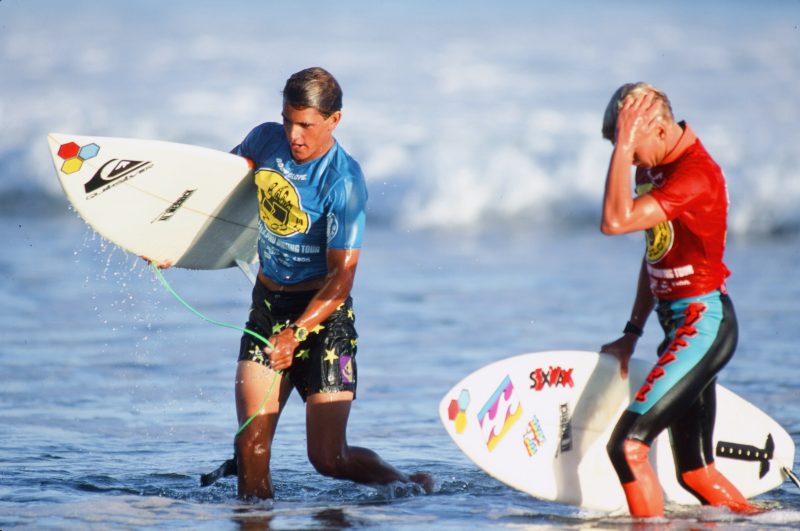
Kelly Slater and his friend Chris Brown exit the water at Trestles, 1990. Photo: Body Glove/Mike Balzer
A Dreamy Day
Ronnie: We had fog delays. This little girl worked for us; her dad lived on a golf course. She brought us bags of golf balls and we were hitting drivers out into the bushes. Kelly Slater came up and he couldn’t hit the ball. He whiffed it. Then he would hit one and it would be a shank. I still have the club in my garage.8
Kelly: I think I whiffed like 10 times in a row. Not even exaggerating. Really funny. Embarrassing actually.
Fig: It wasn’t like [Slater] was all stressed out. They were hitting golf balls out into the marsh.
“The offshore breeze came from behind us and blew all those clouds out and the waves just went completely glassy.”
Richard: Oh gosh I probably was a little nervous with that, like come on Kelly don’t use your energy. I’m sure I was running around going “hey man let’s make sure you stay warm.” Anytime those conditions are changing like that, that can be a distraction and throw you off. Maybe that is why he was hitting golf balls. Just to keep his mind off it. Not to get nervous.
PT: The fog rolled in. We had to put the event on hold for awhile until it burned off. But it was a bonus when it’s like that. When you get that fog bank that sits around all day it keeps everything calm. That is why conditions were so good going into the finals. The conditions were magic.
Mike R.: The offshore breeze came from behind us and blew all those clouds out and the waves just went completely glassy. Some of the nicest waves I have ever seen in southern California.
Pat: We sat there until noon or 1 o’clock until we started surfing. I lost in the quarterfinal. The heat before the quarterfinal, I finally got a good wave and I remember hearing the crowd screaming. I want to throw my hands up, like “look I did it.” Luckily I didn’t because I turned around and there was Kelly on the wave behind me and I realized everybody was screaming for what he was doing. It had nothing to do with me. It was a pretty sobering moment.
Bud: The water was warm, the weather was great. It was just a dreamy day. When we all went out together for the finals we were all laughing and smiling and having a good time. We were going out there to beat each other but we were just saying how cool it was, how good the waves were. Everybody in that heat was a great surfer. I felt I could win but it’s all about who gets the right waves.
Pat: I was really interested to watch the final because I thought Chris actually had a chance. It was an uphill chance but i thought he had a chance. He had won one of the heats over Kelly earlier in the day.
PT: I was expecting Kelly to win it.
Oh, Veeeertical Straight Up!
Richard: In the final he really had to be careful because he had to make all those waves. He didn’t really have the luxury of just doing one big giant air. He had to surf them with a radical approach but he also had to finish the waves the right way and had to utilize the whole wave from start to finish.
Fig: [Slater] wasn’t holding back; he was going for maneuvers right off the bat. For a kid you wouldn’t expect that. Just all style, big, giant fan of water, and throwing a lot of power. His lip bashes were more vertical than what we had been seeing. He was super quick, style was great, super tight little cutbacks.9
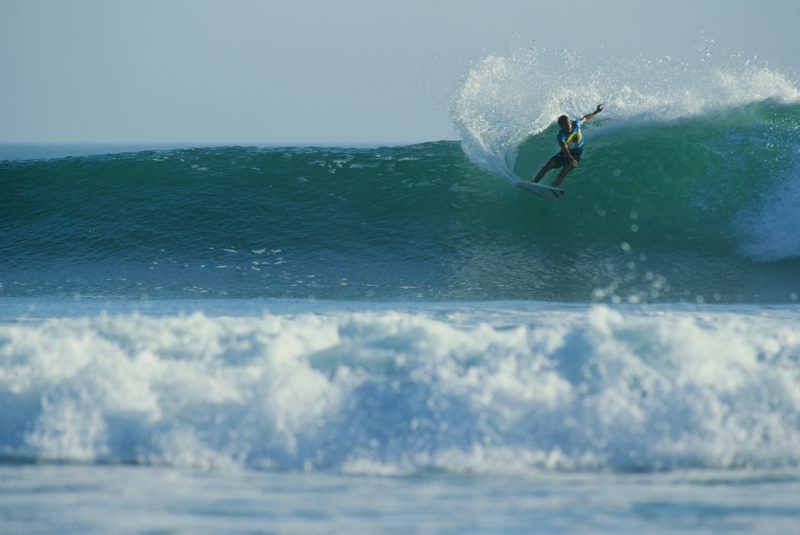
Kelly Slater executes a cutback at Trestles, 1990. Photo: Body Glove/Mike Balzer
Richard: Kelly was riding different boards. They were narrower and they had more rocker.10 You can see it in his surfing, how quick he is coming off the bottom and going straight up into the pocket and how sharp those turns are in the pocket to come back and rebound off the whitewash. It was allowing him to slide that tail and blow those fins out.11 So you have this really talented surfer on a very futuristic or forward thinking surfboard that allowed him to surf in different parts of the wave that guys weren’t really approaching before.
Kelly: I had been riding that board for awhile. I believe that board already had a buckle and crease across the top. That was a board Al Merrick and I had come up with.12 It was narrower and had more rocker than what most guys were riding at the time and probably a bit thinner as well. We were trying to get the volumes of the boards down and get the rocker up and the idea was to trade maneuverability. That was the first step in the evolution of where we were going with boards at the time and boards tended to all go in that direction for a few years.
Pat: At that point he was just a lot faster, he was sharper.
“You have this really talented surfer on a very futuristic or forward thinking surfboard that allowed him to surf in different parts of the wave that guys weren’t really approaching before.”
Richard: We were on pins and needles the entire heat. Everybody is getting good waves and Chris was surfing really good. Kelly would get a good wave and then we would feel really good and then Chris would get a good wave and oh my gosh Chris got a good one. Back then you didn’t know what the scores were. We’re going “who had the better wave?” It came down to the wire of Kelly needed one really good wave to cement a win. Going into the last minutes of that final it was close. Everybody was standing, everybody was screaming. We were out of our minds.
Pat: Kelly had to get a couple waves to come back in the heat.
Mike C.: You are looking at the biggest set of the afternoon here at Lower Trestles. This could be as big as an
8 foot wave set pulling through right now. Out the back let’s see who is going to pick it off. It’s Bud Llamas. He’ll go backside, look at the size of this wave! Well over his head. Big slash! He has still got a lot of open ocean to work with. A big wave, it is still forming up nicely for him. So he has had two big slashes. The backsider is just ripping this wave to shreds. Whitewater flying everywhere. He ends it all with an elevator floater. That’s a high scoring wave.13
Bud: Wow, yeah, I remember that. Just so dreamy, you know? That ride of mine, that was one of my more memorable ones.
Mike R.: Bud Llamas I thought has the best wave of the day and just surfed out of his mind and, boom, Kelly comes in right behind.
PT: Slater has gone back out there. Here he is. He got away from the other guys. Oh, veeeertical, straight up! Drops down to the bottom, squares it off again, an open faced snap! He sets up again, drives down the line, comes off the top. Sets up for the inside, goes off the bottom, floats over that whitewater and a big snap on the inside.13
Mike R.: Rockin’ Fig did the play by play from loudspeakers and he was just screaming bloody murder.
Fig: Everybody was screaming because the level of surfing was so incredible.
Mike R.: What he was doing and where he was doing it on the wave really elevated surfing. He would go vertical right at top of the wave. It was unbelievable how quickly he could turn that board around. At Trestles I saw it that day.
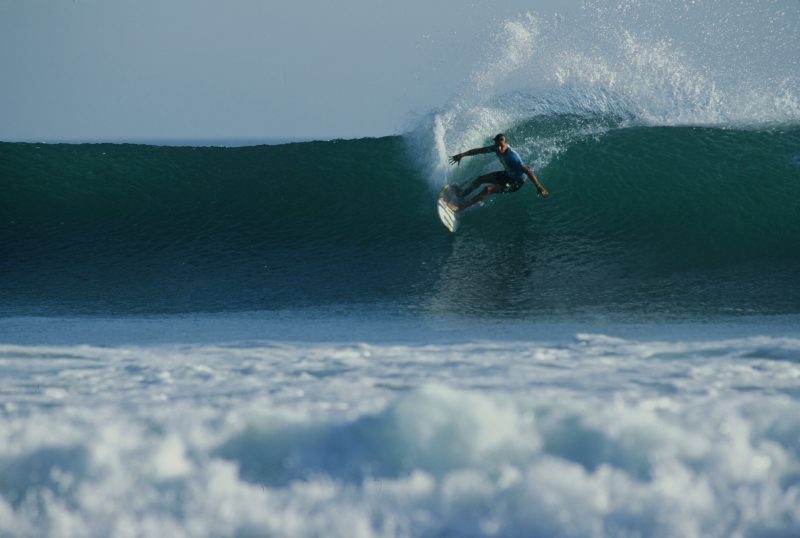
“We were on pins and needles the entire heat.” Photo: Body Glove/Mike Balzer
Kelly: There was one wave I had that was the best wave of the final. I rode it the right way and that really was the
point of difference between Chris and I. We didn’t have live scoring at the time so nobody knew where they stood in relation to each other. It truly wasn’t going to be anyone knowing until we got on stage and they read the results. I thought Chris and I were close but I thought I won.14
Richard: You can see he is pretty nervous standing on stage. He has got his head down and he is just going ‘man please did I win this.’
I’ll Keep It
PT: Slater’s first big win, boy is he happy about it. I would be too, $30,000. He is a happy young man.13
Mike C.: You get the feeling this is the first of many checks to come for this young man out of Florida.13
Kelly: I was overcome with emotion. I felt like I delivered what I had to. I always had this belief in myself from the time I was a little kid. I was always really good with sports and I had this real belief that I was going to be great at something and to me that event signified all of that coming together and on a public stage. It was exciting for me. I realized at that moment that I had a full fledged career where I would be able to make a living and do what I love.15
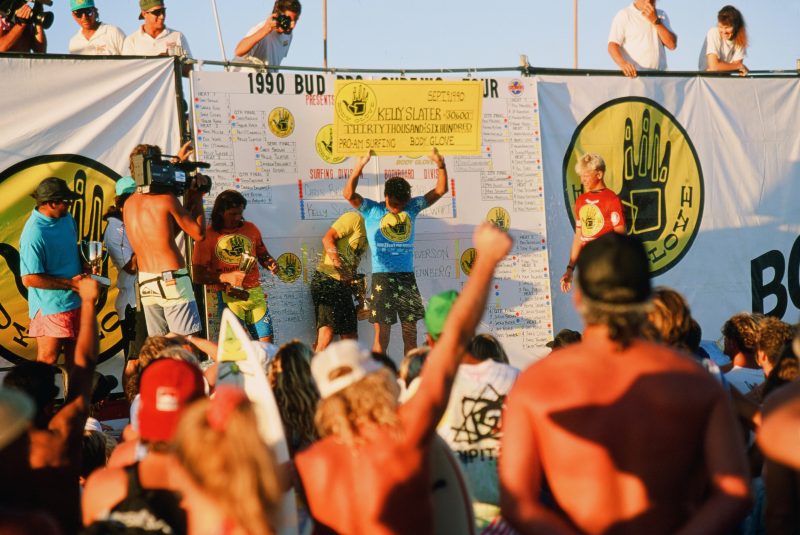
Kelly Slater up on stage, hoisting his victory check. Photo: Body Glove/Mike Balzer
Mike R.: He walked up to us afterwards and he is carrying the check and I pointed down and said “what are you going to do with it?” He says “I’ll keep it.”16 He said it with a wink in his eye. He smiled. It was just a lot of money to an 18 year old kid in early 1990s. Kelly didn’t grow up poor but he didn’t grow up rich either. That money really meant something to him and his family. That was when I felt he really grew up. And I think that is why he was so excited about the check, he was realizing “damn I really am a professional now.”
Kelly: It was between half and a third of what I would make a whole year on my [Quiksilver] contract. I think I was making 75 to 100 grand on my contract. In the matter of a couple of days, seven rounds of surfing I make half that much money, pretty cool. It was actually $30,600. The reason that was significant was because if you won a heat you would get an extra 100 bucks and there were seven rounds and I won six of my rounds going into
the final. In some weird, bizarre way I almost like that $600 more than the $30,000. That showed how much work I put into each round.
“He is carrying the check and I pointed down and said “what are you going to do with it?” He says “I’ll keep it.”
Fig: He had to have been the happiest guy in the world.
Richard: I was with him and we were all so stoked for him because years and years of work went into that win. From there that opened the door of ok, you can do it, and now let’s go after that world tour and potential world titles. It was a big deal.
Kelly: I think that single event I can probably look back and argue that was the most significant event for me maybe in my life. Because Chris Brown was the next guy really. He was a little older than me. A little more refined; he had already won more events. I think had he won that contest it would have elevated his game quicker.17
Richard: After the contest we said wow we have to build on this. Let’s schedule some trips and start making a surfing movie. Like really get serious about it.18 Sometime in late December or early January the guys at Quiksilver came to me and said how is that project going with Kelly? Can you give us a finished product for an upcoming trade show in a couple weeks? I haven’t done any of the interviews. Kelly is in Hawaii so I
had to fly him to California. He came back to the same house he stayed at for the contest and we did all the interviews in one take. I did that all in the kitchen and the backyard.
Richard: What do you do when you are not surfing?
Kelly: Homework.
Richard: Do you like school?
Kelly: Sometimes.
Richard: What do you like about school?
Kelly: Teachers.
Richard: What is your dog’s name?
Kelly: Buddy.
Richard: Do you have a favorite board?
Kelly: I broke it. The other got stolen.
Richard: Do you like drugs?
Kelly: No.19
Kelly: When I see that, I see myself unaffected by a history of things in my life. I am aware of the camera being on me only in the sense that I was a little bit sort of shy and nervous. I wasn’t trying to send a message. I wasn’t trying to promote something else. I wasn’t trying to sell a pair of trunks. There is an innocence about that time for me that felt really nice and refreshing and pure. I mean, shit, I would love to go back and live that again right now. I would love to go back to that time and those moments and experience those again, completely.
Pat: It was a moment in time that something for the sport of surfing happened. People went wait a second we have been holding events in crappy beach towns, erecting scaffolding up in these parking lots, we get little to no media but some butts on the beach and that’s what we thought professional surfing was. But all of a sudden it’s like we can hold these things in decent waves. People will record it, they will film it, it will get out into the world. It’s way more enjoyable. Put the best guys out in water and it’s 4 to 5 foot at Trestles and you see all sorts of great stuff.
Fig: It was the start of a new beginning.
“I wasn’t trying to send a message. I wasn’t trying to promote something else. There is an innocence about that time for me that felt really nice and refreshing and pure. I mean, shit, I would love to go back and live that again right now.”
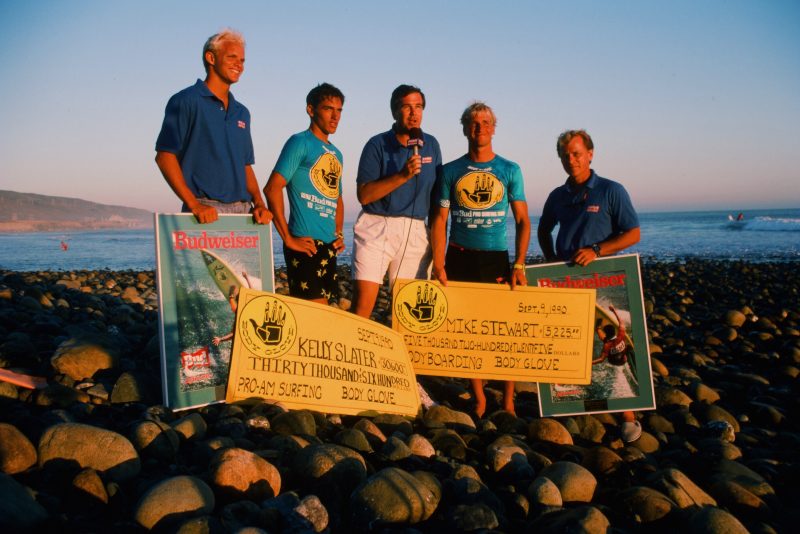
Kelly Slater, second from left, speaks with broadcasters Mike Chamberlin, middle, and PT Townend, far right, after his first pro win. Photo: Body Glove/Mike Balzer